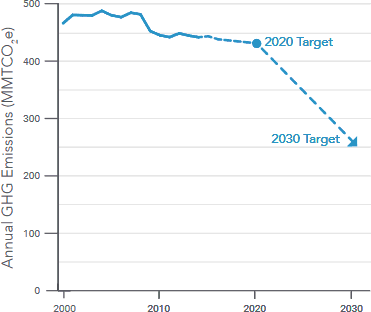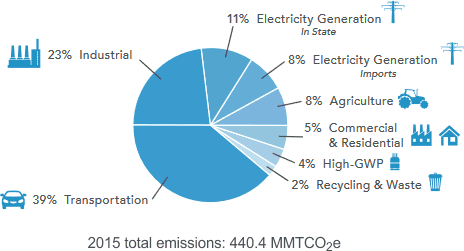California ARB approves 2030 climate plan, $663 million in low-carbon transportation funding
15 December 2017
The California Air Resources Board (ARB) approved the 2017 Climate Change Scoping Plan that sets the GHG emission reduction goals for the state for the next decade, through 2030. As part of the climate action, the agency also approved a $663 million low-carbon transportation plan to increase the use of clean cars, heavy-duty trucks, buses and freight equipment.
Eleven years ago, the Global Warming Solutions Act (AB 32) set the goal of reducing GHG emissions to 1990 levels by 2020. California is on track to exceed that target. The 2017 Scoping Plan sets the state on a very ambitious course to reduce climate-changing gases an additional 40% below 1990 levels by 2030. This will require California to double the rate at which it has been cutting climate-changing gases.

[2017 Scoping Plan]
The Scoping Plan addresses the major sources of GHG emissions from various sectors of the economy:
- More Clean Cars and Trucks: The plan sets out programs to incentivize the sale of millions of zero-emission vehicles, drive the deployment of zero-emission trucks, and shift to a cleaner system of handling freight statewide.
- Increased Renewable Energy: California’s electric utilities are on track to meet the requirement that 33% of electricity come from renewable sources by 2020. The Scoping Plan guides utilities to 50% renewables by 2030, as required under SB 350.
- Slashing Super-Pollutants: The plan calls for reductions in emissions of super-pollutants such as methane and HFC refrigerants, which are responsible for as much as 40% of global warming.
- Cleaner Industry and Electricity: California’s renewed cap-and-trade program extends the declining cap on emissions from utilities and industries and the carbon allowance auctions.
- Cleaner Fuels: The Low Carbon Fuel Standard will continue to require that renewable transportation fuels increasingly replace fossil fuels.
- Smart Community Planning: Local communities will continue developing plans to reduce emissions through more sustainable transportation and housing policies.
- Improved Agriculture and Forests: The Scoping Plan also outlines programs to account for and reduce emissions from agriculture, as well as forests and other natural lands.

[2017 Scoping Plan]
Transportation contributes 39% of California climate-changing emissions. The adopted low-carbon transportation plan includes a range of incentives that range from supporting increased numbers of zero-emission heavy-duty trucks and buses, and zero- and near zero-emission freight facilities, to rebates for the cleanest passenger cars.
Heavy-Duty Vehicles and Off-Road Equipment
- $188 million to promote the sale of clean trucks and buses through voucher incentives, driving the continued deployment of hybrid, low-NOx, and zero-emission trucks and buses.
- $190 million for advanced technology freight-related investments that will bring the cleanest vehicles and equipment to California’s most impacted communities, transportation corridors and freight hubs.
- $20 million to make loans for clean trucks more widely available.
Passenger Vehicles and Transportation Equity
- $140 million to the Clean Vehicle Rebate Project, which offers up to $5,000 in vehicle rebates for the purchase or lease of new, eligible zero-emission and plug-in hybrid vehicles.
- $125 million to transportation equity projects focused on disadvantaged communities and low-income consumers. These include programs to scrap and replace older vehicles with up-to-date clean cars, cleaner school buses, and more electric car-sharing projects in disadvantaged communities.
These investments support the emission reduction goals of the 2017 Climate Change Scoping Plan, as well as the State Implementation Plans and the California Sustainable Freight Action Plan.
Source: California ARB